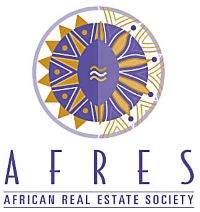Editorial for JARER Vol 6, Issue 2, 2021
DOI:
https://doi.org/10.15641/jarer.v6i2.1145Keywords:
editorial, research, journal, real estate, Africa, African, South Africa, University of Cape Town, African Real Estate Society, 2021Abstract
Welcome to Volume 6 (2021), Issue 2 edition of the Journal of African Real Estate Research (JARER). JARER has provided valuable resources that support academics and professional researchers in Africa and those interested in the African continent. Our journal offers an exciting platform for disseminating scholarly and the different types of applied research engaged within the real estate sector in Africa. This issue is coming as the first regular issue of 2021. The journal's first issue gave way for the Special Issue published in June 2021. For this reason, we want to apologize to the authors whose papers were accepted earlier in the year for the delay in publication. To forestall this situation in the future, the JARER management team has decided to start publishing individual papers in digital format on our website once accepted and while waiting to be published with a full issue at the appointed time.
Karen Gibler and Geci Karuri-Sebina's diligent and painstaking efforts in supporting the journal with the successful publication of the special issue titled: Women in African Real Estate and Urban Development Research are highly appreciated. Our gratitude also goes to the journal editorial board members and the anonymous reviewers, who have been supporting and inspiring the management team, making it possible for us to improve the rate of submissions. We appreciate the continued support of the African Real Estate Society board members. Similarly, we appreciate the constant support we receive from the team and colleagues at the Library Services for the University of Cape Town, South Africa. We like to put on record the assiduous efforts of our former managing editor - Mr Luke Boyle - whose diligence and teamwork we so much enjoyed, and as he heads on to other endeavours in his life, we wish him the best. The untiring efforts of our new managing editor - Ms Lesedi Kgaka - with a view to moving the journal's operation forward and onto the next level are highly appreciated. Our thanks go to Prof. Karl-Werner Schulte and his team from the IREBS at Regensburg University, the IRES, ERES, from whom JARER continues to receive strong support.
The current issue contains seven papers focusing on a wide range of topics covering diverse areas of interest in gender differential in real estate entrepreneurship, integrated rural development, housing affordability, indoor environmental quality, tenure security, resource utilization and automation in valuation.
The first paper's focus is on the potential of integrated rural development schemes for improving rural housing infrastructure. A case study of the Rural Development Programme (RUDEP) of Justice Development and Peace Makers' Centre (JDPMC), a non-governmental organization in Osun State, Nigeria, was conducted. The findings led to the conclusion that the RUDEP integrated scheme could be a viable policy option for improving the condition of rural housing in Nigeria.
The second paper takes a holistic view of the housing affordability problem in Africa. It considered the multifaceted nature of the problem vis-à-vis the political, social, institutional, economic and financial milieu of Africa. The paper concluded that the enormity of the problem of housing affordability in Africa is a function of, among others, the vested interest of the power brokers who were profiting from it, the market, the unwitting application of western models to Africa, poverty, and the sheer neglect by the housing policymakers of Africa of the time-tested African means of affordable housing delivery.
The apparent domination of the real estate business environment by the male gender and the entrepreneurial intentions of men and women in the real estate sector are the concerns of the third paper from Nigeria. The paper studied the intentions of real estate students at three Nigerian universities to understand better barriers and supporters that shape students' entrepreneurial intentions. In doing this, the paper showed how gendered differences might impact students' entrepreneurial aspirations. The conclusion suggests gender-based differences in the entrepreneurial aspirations of real estate students in Nigeria.
The fourth paper evaluated the Nigerian Tertiary Education Trust Fund (TETFund) intervention projects and space utilization in Nuhu Bamalli Polytechnic (NUBAPOLY), Zaria, Kaduna state, Nigeria. The results revealed that the construction of new buildings and laboratory equipment and furniture provided the main focus of TETFund intervention projects. At the same time, the overall space utilization for NUBAPOLY stood at 43.60%. The paper recommended that TETFund ensure adequate utilization of its intervention projects through supervision and inspection. At the same time, the management of Nuhu Bamalli Polytechnic should make optimum utilization of TETFund intervention projects.
The fifth paper examines property valuers' perceptions of the adoption of automated valuation models (AVM) in rating valuation against the use of traditional valuation methods in Malawi. The findings showed that the general perception of Malawi's valuers towards AVM was mixed. While one school of thought gave AVM the benefit of the doubt for future incorporation into the profession if modified to suit the local environment, the other hand considered AVM a threat to the valuation profession since anyone may be deemed qualified to carry out property valuation. The conclusion was that AVM could be adopted as a supplement to the traditional valuation methods but not a replacement.
The problem of land tenure security with a view to promoting and motivating land-based investment has been the focus of many countries and development partners and calls for a continuous effort at addressing this critical issue. This is the focus of the sixth paper. The paper explored the factors affecting tenure security for legal landholders in Bahir Dar City in Ethiopia. The results suggest that the perception of landholders about land tenure security was low, with consequences of disinvestment and lack of confidence of ownership on the land and property held in the city and fear of expropriation or involuntary relocation.
The seventh paper is a literature review of research methods that seek to establish the measurement of individual productivity and organizational performance in office buildings containing enhanced green building features and initiatives that specifically focus on indoor environmental quality (IEQ). The paper used the PRISMA framework and included thirty-nine academic papers from 2000 to 2020 to discuss different research instruments such as post-occupancy evaluations (POE), longitudinal surveys, and interviews. The key findings highlighted that previous research measured individual productivity via self-assessment. At the same time, no research had successfully measured organizational performance within the context of green building features and initiatives.
Our sincere hope that you will find the papers in this issue of the Journal of African Real Estate Research interesting, thought-provoking, and informative. We appreciate and encourage feedback from readers on their views of this and previous issues of the journal.
Prof. Abel Olaleye
Editor-in-Chief
Downloads
Downloads
Published
Versions
- 2022-02-17 (2)
- 2022-02-04 (1)
How to Cite
Issue
Section
License
Copyright (c) 2022 Abel Olaleye

This work is licensed under a Creative Commons Attribution 4.0 International License.




